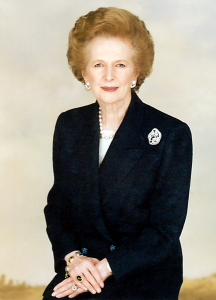Margaret Thatcher – 1983 Statement on Falkland Islands Report
Below is the text of the statement made by Margaret Thatcher, the then Prime Minister, in the House of Commons on 18 January 1983.
With permission, Mr. Speaker, I will make a statement about the report of the Falkland Islands review committee.
The House will remember that I announced the setting up of the review committee in July 1982, after consultation with the right hon. Gentleman the Leader of the Opposition and with leading Privy Councillors in other parties. At that time I expressed the hope that the committee would be be able to complete its work within six months.
The committee has justified that hope. I received its report on 31 December 1982, and I am presenting it to Parliament as a Command Paper this afternoon. Copies are now available in the Vote Office.
I should like to express the Government’s gratitude to the noble Lord, Lord Franks, and to his colleagues for the amount of time and effort which they have devoted to producing such a thorough and comprehensive report in so short a time.
The report makes it clear that the committee was provided with all the papers relevant to its terms of reference, including a comprehensive collection of reports from the intelligence agencies. The committee’s report contains a number of references to intelligence matters which would not in other circumstances be divulged. These references are essential for a full understanding of the matters into which the committee was asked to enquire, and the Government have agreed that the public interest requires that on this occasion the normal rule against public reference to the intelligence organisation or to material derived from intelligence reports should be waived.
The Government have, however, agreed with Lord Franks amendments to certain of the references to intelligence reports with a view to minimising potential damage to British intelligence interests. Lord Franks has authorised me to tell the House that he agrees that, first, all the references to intelligence reports included in the committee’s report as submitted have been retained in the report as presented to Parliament, most of them without amendment; secondly, none of the amendments that have been made alters the sense, substance or emphasis of the reference to the intelligence report concerned, or removes anything of significance to the committee’s account of the matters referred to it or to its findings and conclusions; thirdly, apart from those agreed amendments, no other deletions or amendments have been made to the committee’s report as submitted.
The report is unanimous and is signed by all the members of the committee without qualification. It falls into four chapters. The first gives an account of the dispute from 1965—when the issue was first brought formally to international attention by a resolution of the General Assembly of the United Nations—to May 1979.
The second chapter covers the period from May 1979 to 19 March 1982. The third deals with the fortnight from 19 March to 2 April 1982, which included the South Georgia incident and which led up to the Argentine invasion of the Falkland Islands. The fourth and final chapter deals with the way in which the Government discharged their responsibilities in the period leading up to the invasion. There are six annexes, the first of which deals with 10 specific assertions that have been made by some who have commented on the matters in question.
In the fourth chapter of the report—that is, the one that deals with the way Government discharged their responsibilities—the committee notes a number of points where, in its judgment, different decisions might have been taken, fuller consideration of alternative courses of action might have been advantageous, and the machinery of government could have been better used. That chapter defines and addresses itself to two crucial questions: first, could the Government have foreseen the invasion of 2 April 1982; secondly, could the Government have prevented the invasion?
The committee emphasises that its report should be read as a whole. At this stage, therefore, I shall do no more than quote the committee’s conclusions on those two crucial questions. On the first question, whether the Government could have foreseen the invasion of 2 April, the committee’s conclusion is: In the light of this evidence, we are satisfied that the Government did not have warning of the decision to invade. The evidence of the timing of the decision taken by the Junta shows that the Government not only did not, but could not, have had earlier warning. The invasion of the Falkland Islands on 2 April could not have been foreseen. I have quoted the whole of paragraph 266.
On the second question, whether the Government could have prevented the invasion, the committee’s conclusion, contained in the final paragraph of the report, is: Against this background we have pointed out in this Chapter where different decisions might have been taken, where fuller consideration of alternative courses of action might, in our opinion, have been advantageous, and where the machinery of Government could have been better used. But, if the British Government had acted differently in the ways we have indicated, it is impossible to judge what the impact on the Argentine Government or the implications for the course of events might have been. There is no reasonable basis for any suggestion—which would be purely hypothetical—that the invasion would have been prevented if the Government had acted in the ways indicated in our report. Taking account of these considerations, and of all the evidence we have received, we conclude that we would not be justified in attaching any criticism or blame to the present Government.
May I finish the conclusion of the Franks Committee? It was its conclusion and has nothing to do with the Government. It said: we conclude that we would not be justified in attaching any criticism or blame to the present Government for the Argentine Junta’s decision to commit its act of unprovoked aggression in the invasion of the Falkland Islands on 2 April 1982. I have quoted in full the final paragraph of the Franks report.
Time will, of course, be found for an early debate, and that will be discussed through the usual channels. The Government will welcome an early opportunity of discussing the matters contained in the report more thoroughly than is possible this afternoon.


